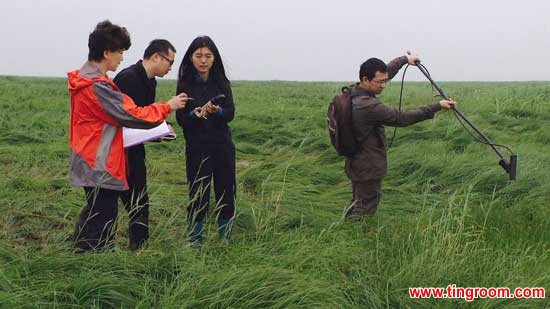-
(单词翻译:双击或拖选)
Water shortages are giving rise to the transformation of Chinese cities into what's called 'sponge cities,' where rain water is collected rather than allowed to run off. In April, the government announced that 16 cities will take part in the Sponge City pilot program. In our final episode of “Half Empty”, Han Bin talks to a senior architect in Shanghai, who has been pioneering the concept, who sees the glass as half full.
It's all about water. A herdswoman is using every drop to save her homeland. A ranger in China's water tower warns creeks are drying up.
A scientist is documenting the shrinking wetlands.

Water shortages are giving rise to the transformation of Chinese cities into what's called 'sponge cities,' where rain water is collected rather than allowed to run off. In April, the government announced that 16 cities will take part in the Sponge City pilot program.
And in Shanghai, whose name means "On the Sea", an architect is designing solutions to quench the thirst that comes with growing urbanization.
For the past decade, Kuang Xiaoming has been championing the "sponge city"
"Modern cities hope to use land resources efficiently for more buildings. Urban planners are searching for how to maintain a natural environment between man and nature, within highly densely populated living spaces. Our research programs focus on how to transform into sponge eco-cities, to collect rainwater underground through numerous ways, like green roofs, breathable pavements, and rain gardens. Then, our land can absorb excess water, just as our constructions soak up them. We treat water in a natural way and reduce run-off," Kuang said.
The “sponge city” concept comes from western countries. Kuang Xiaoming says Chinese cities need to use rainwater to replenish groundwater.
He says it’s not difficult to collect -- the key is doing it the right way. His institute has designed many eco-community models, to promote the idea to the general public.
Some have already come into being; with more in the design stages.
"Nature has its own complete cycle. We should try to respect and not to destroy it. The core idea of future cities should be in accordance with the laws of nature. Most of the rainwater should be stored underneath rather than being sent out to the sewers and to the oceans, the way most cities are designed. In the future, the groundwater system can better drain water and retain it. The water can then be used multiple times," Kuang said.
The new concept may help reclaim a lost way of life -- keeping as much water as possible.
Kuang Xiaoming showed us this test model in Shanghai. The building uses solar energy to raise collected rainwater to form a waterfall. The waterfall can then cool the building during summer. It also creates unique scenery.
The aim is to hold the same amount of water if there were no buildings.
Kuang Xiaoming says modern building designs prioritize eco-functions, rather than iconic shapes and strange or flashy exteriors.
"One of the key elements of living in good cities is that we still live in a natural environment. We still have a close relationship with nature; we can see the mountains, play with the water, and touch the homeland. We should not overuse the natural resources and always want to conquer nature. Building cities will definitely take away land, but what we should consider is how to keep as much of nature as possible,” Kuang said.
There are no easy solutions for China’s worsening water crisis. It’s often a choice of how to live with what’s available and who should get the resources. Moving from half empty to half full means both the government and the people need to do much more. The questions remain of how we use water and how long we have.
Kuang Xiaoming sees hope for China’s future. He's confident "Sponge Cities" are part of a wide-ranging solution. Man doesn't live in water the way a fish does, but he needs it just as much.

Water shortages are giving rise to the transformation of Chinese cities into what's called 'sponge cities,' where rain water is collected rather than allowed to run off. In April, the government announced that 16 cities will take part in the Sponge City pilot program.

Water shortages are giving rise to the transformation of Chinese cities into what's called 'sponge cities,' where rain water is collected rather than allowed to run off. In April, the government announced that 16 cities will take part in the Sponge City pilot program.

















